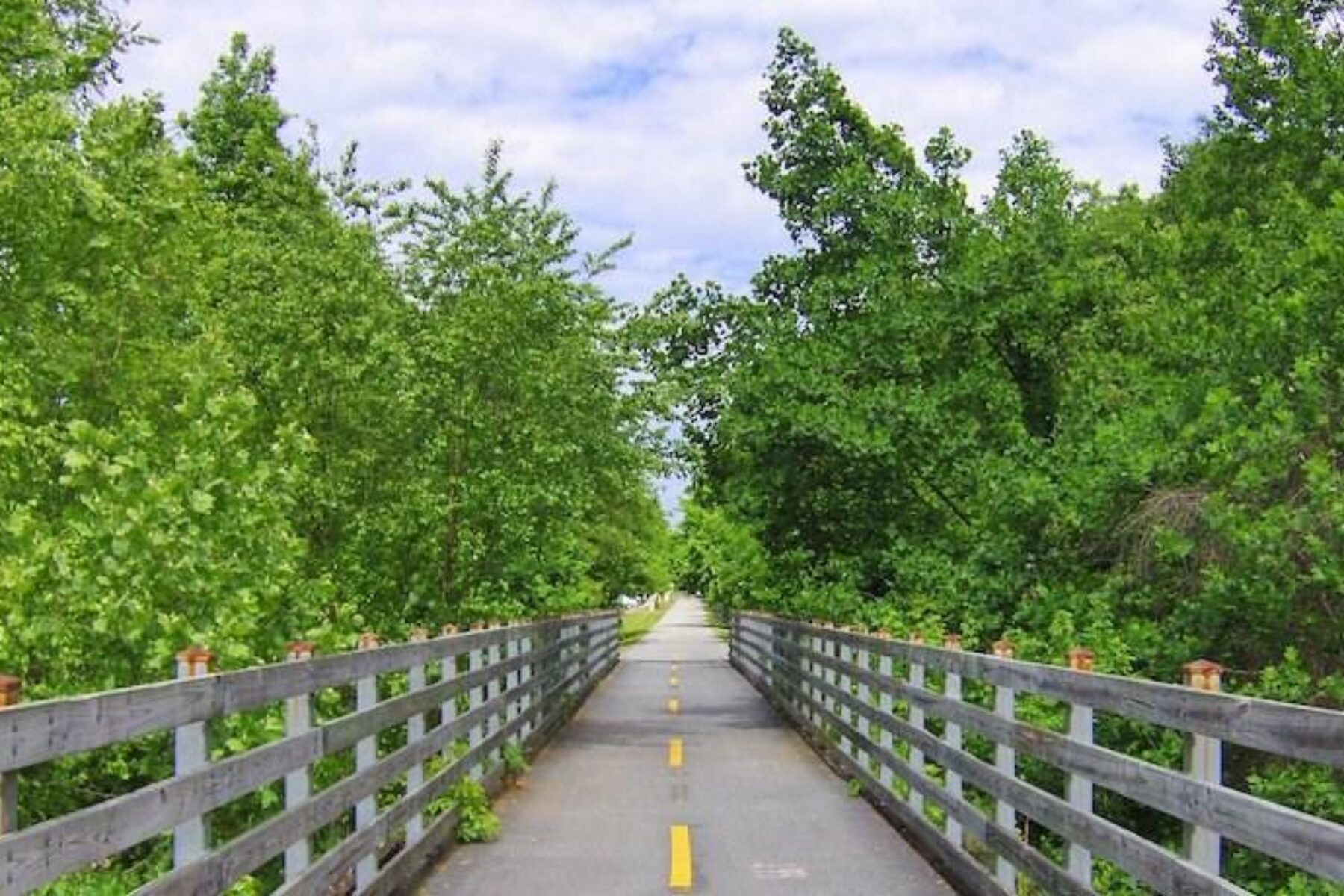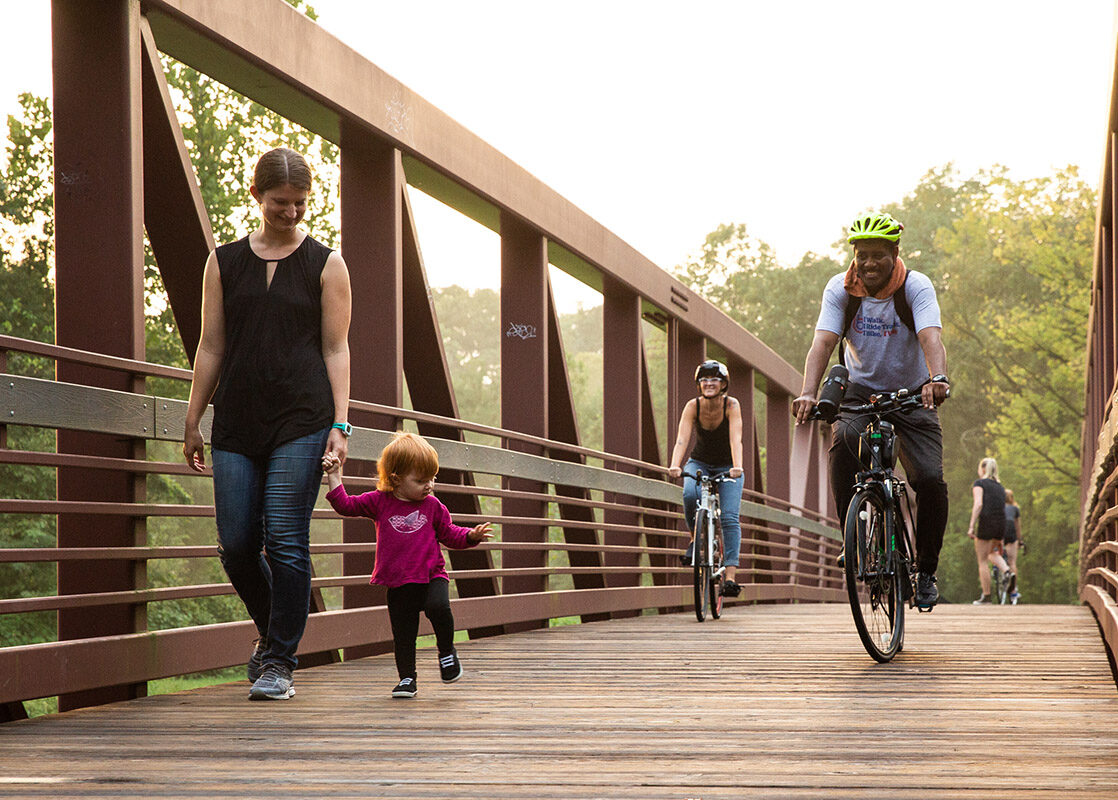The Build Back Better Act Could Create New Opportunities for Trail and Active Transportation Funding

Update: On Nov. 19, 2021, the U.S. House of Representatives passed the Build Back Better Act. It now moves to the U.S. Senate for consideration.
For a few months now, Congress has been negotiating two bills that could create significant new opportunities for trails and active transportation. The Infrastructure Investment and Jobs Act, which just passed the U.S. House of Representatives and is headed to the president’s desk for signature, includes reauthorization of the nation’s federal surface transportation investment. The Build Back Better Act, which is often referred to publicly as the social spending package and largely focuses on social programs like education and health care, also includes significant investment in transportation. The fates of these bills have been tied together politically because some members of Congress are unwilling to vote for the infrastructure bill unless the social spending package is on track for passage.
Related: Read RTC’s analysis on the Infrastructure Investment and Jobs Act
Today, the House made progress by clearing a procedural vote for the Build Back Better Act and setting the bill up for passage.
Assuming the Build Back Better Act moves through the Senate without any additional changes, the current language includes programs that address critical transportation and infrastructure issues, such as economic development, reduction of greenhouse gas emissions, and equity. These programs are not dedicated solely to trails and active transportation, however, such projects are eligible for funding. One program specifically includes two RTC proposals: active transportation connectivity grants and resources to support equitable community engagement in transportation priority-setting. These programs highlight the opportunities that investment in trails and active transportation provide to address some of the most critical challenges we face in the nation.
What’s in the Bill
Specifically, the following provisions in the Build Back Better Act could provide powerful, new investment in the nation’s trail and active transportation networks.
Key Programs for Biking and Walking
Section 110002 – Community Climate Incentive Grants. Provides $950 million for carbon reduction projects for states that have adopted carbon reduction strategies aimed at achieving net-zero by 2050, and $3 billion for carbon reduction projects (including zero-emission transportation options, like bicycling and walking, and projects that reduce dependence on single-occupant vehicle trips) to eligible entities that are not states (predominantly local governments, tribes and municipal planning organizations).
Section 110003 – Neighborhood Access and Equity Grants. Provides $3.95 billion for eligible projects, including removal of barriers to affordable and safe transportation access, complete streets, multiuse trails, regional greenways, and active transportation networks or spines; or to provide affordable access to essential destinations, public spaces, transportation links and hubs. It can also include grants to eligible entities (including community organizations) for planning and capacity-building activities in disadvantaged or underserved communities. Of the total, $1.58 billion must be used for projects in communities that are economically disadvantaged, have a community benefits agreement or anti-displacement policy, or have a plan for employing local residents impacted by the activity or project.
Other Transportation-Related Provisions With Benefits for Active Transportation
Section 110001 – Affordable Housing Access Program. Provides $9.75 billion to support the enhancement of mobility options for residents in disadvantaged communities or neighborhoods, in persistent poverty communities or for low-income communities generally. Eligibilities favor transit, but also include “projects to upgrade the accessibility of bus or rail public transportation services for people with disabilities, including individuals who use wheelchairs,” which positions active transportation infrastructure well.
Section 110004 – Territorial Highway Program Funding. Provides $320 million for programs in Puerto Rico and the territories for projects that can include anything eligible under the Surface Transportation Block Grant Program, including multiuse trails and other active transportation infrastructure.
Section 110005 – Traffic Safety Clearinghouse. Provides $47.5 million for a grant or contract for a research institution to develop and operate a national clearinghouse for fair and equitable traffic safety enforcement programs and to assist in data collection and development of best practices for traffic safety enforcement, including enforcement of measures intended to protect the safety of people walking and bicycling.
Section 110009 – Economic Development Administration. Provides $3.36 billion to the U.S. Secretary of Commerce to develop regional economic growth clusters pursuant to the Public Works and Economic Development Act of 1965, to alleviate long-term economic deterioration and sudden and severe economic dislocation. Also, $1.2 billion for grants to local governments to alleviate persistent economic distress and labor market dislocation, in communities that develop a “recompete plan” designed to address the economic challenges of the eligible area and promote long-term, sustained economic growth and a reduction in unemployment. $240 million is to be provided for “energy and industrial transition communities,” and another $240 million is for predevelopment and capacity building activities including stipends to local organizations for planning participation, community outreach and engagement activities.
Section 110018 – Environmental Review Implementation Funds. This provision would provide $50 million for processing environmental review for projects and to provide grants to project sponsors to help them cover the costs of environmental review for any project that requires it, including trails and active transportation.
Programs Outside the Transportation Title That Create Opportunities for Trails
Section 11001 – National Forest System Restoration and Fuels Reduction Projects. Appropriates $450 million for the Legacy Roads and Trails program of the Forest Service; $350 million for National Forest System land management planning and monitoring prioritized on specific goals; and $100 million for the maintenance of trails on National Forest System land, with a priority on trails that provide underserved communities access to these outdoor spaces.
Section 40404 – Infrastructure in Low- and Moderate-Income Neighborhoods. Provides $3.05 billion for the Community Development Block Grant (CDBG) program, which has a wide range of eligibilities, including acquisition of property and construction of infrastructure meant primarily to assist low- and moderate-income neighborhoods. CDBG is allocated directly to larger “entitlement” communities and also available by application to smaller “non-entitlement” communities.
Section 70703 – Lands Projects. Provides $500 million to the U.S. Secretary of the Interior for grants or contracts to perform conservation projects or resiliency and restoration projects on public lands administered by the National Park Service or Bureau of Land Management. Not subject to cost-share requirements.
Section 70706 – Urban Parks. Provides $100 million to the National Park Service for grants to localities for acquisition of land or interests in land, or for the development of recreation facilities to create or significantly enhance access to parks or outdoor recreation in urban areas.
Section 70708 – National Heritage Areas. Provides $50 million to the Director of the National Park Service for National Heritage Area Partnerships, including for any national heritage area, national heritage corridor, cultural heritage corridor, national heritage partnership, national heritage canalway, national heritage route, and battlefields national historic district that is authorized to receive federal funds as of Sept. 1, 2021.
Section 136407 – Credit for Certain New Electric Bicycles. Provides a 30% refundable tax credit, up to as much as $1,200, for the purchase of a qualified electric bicycle placed into service before Jan. 1, 2027. The credit is phased out for people making over a certain income. Learn more about the tax credit from our partners at PeopleForBikes.
What You Can Do
The Build Back Better Act contains grant programs critical to growing and supporting active transportation networks. Some programs, like the Neighborhood Access and Equity Grants, are set to take effect immediately in fiscal year 2022, which began in October. With so many new opportunities to access funding for trails, walking and biking, it is imperative that trail groups be prepared to put forward their bold and compelling trail and active transportation plans as soon as these programs take effect. RTC encourages trail planners and groups to begin pulling together materials useful for grant applications. Materials such as those used in earmark or RAISE grant requests may provide a useful starting point. Beyond documented trail plans, this may include data that shows the demand for trails, inclusion in a TIP or STIP, as well as projected equity and economic benefits. RTC will continue to provide updates as we learn more about how to access these opportunities should the bill realize full passage with these provisions included.
The Bipartisan Infrastructure Law includes some changes to familiar programs and adds new funding opportunities for trails and active transportation. RTC’s resources offer the latest information to assist in identifying appropriate potential federal funding opportunities for your trail and active transportation projects and taking the necessary actions to successfully apply for these opportunities.

Donate
Everyone deserves access to safe ways to walk, bike, and be active outdoors.